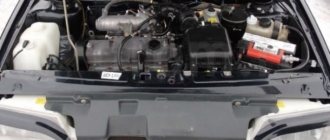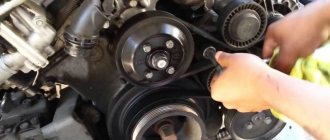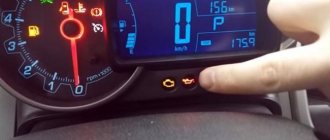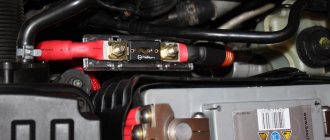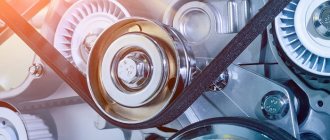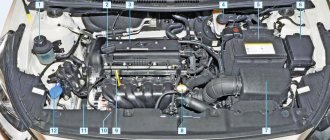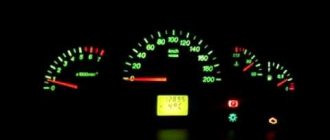Engine noise - where does it come from?
More common causes of excessively loud engine idling include:
- The electronic engine control unit increases speed to prevent engine stalling.
- Increased clearances are also one of the reasons for the increased noise of a running engine. Such increased gaps between the surface of the cylinders and pistons contribute to increased load on the units and, naturally, noise. When the parts heat up while the engine warms up, the gaps decrease and the noise subsides.
- If the car has a significant mileage of over 100,000 km, the cause of the unusual sound may be hydraulic compensators. Coking of the channels can become an obstacle to the operation of the oil pump and the flow of oil into the engine. At the same time, a characteristic “clatter” is heard, which decreases as the engine warms up and then disappears.
An increase in the engine speed of a cold engine occurs by enriching the fuel mixture. This compensates for unburned fuel, the cause of which is the reduced engine temperature. In addition, increased speed is necessary for stability of operation and sufficient lubrication of the rubbing surfaces of parts, since, due to the increased viscosity of the oil at low temperatures, the operation of the oil pump is difficult.
An increase in the number of revolutions during warm-up is also necessary to quickly achieve the optimal temperature of the catalyst and reduce the toxicity of exhaust gases.
As the engine temperature rises, the control unit reduces speed and the noise becomes weaker. Reducing noise after warming up also helps to reduce clearances and reduce oil viscosity. Therefore, increased noise when the engine warms up is not a sign of a car malfunction.
Low engine noise level VAZ 2110
5 months ago I decided to do the first diagnostics on this car, and I saw this error (the check did not light up, apparently the lamp was burnt out). At first I didn’t understand what the point was, but then I figured it out.
The fault code “low engine noise level” in translation means an open circuit of the knock sensor, first scored, does not affect the speed, etc. but over time I somehow began to lack engine thrust and not long ago, I accidentally came across a topic in a Chevy club , where they write that if this sensor breaks, the OZ is automatically set to a later one, that is, the ECU is completely insured against possible outbreaks of detonation, which leads to increased fuel consumption, dullness, and loss of engine traction.
here it is the BOSCH sensor itself
Today I decided to install it, connected the laptop, and lo and behold!
the DD ADC channel began to change in the range from 0.2 to 1.2 volts, which means the sensor is serviceable and operating. On the Russian DD from 2112, the channel was 0.1v and did not rise, well... it’s not for nothing that there is a saying, the miser pays twice.
Objectively, the shaking at idle disappeared, but not completely, of course (thanks to the hydraulics), the engine began to run somehow softer, I couldn’t take it for a ride, the blower was removed) I’ll take it for a drive soon and tell you about the changes. Sorry for the mistakes) I hope my story will help someone in the future.
Now in the near future I plan to do chiptuning, I will do it myself, the firmware is already ready, but more on that in the next blog
During the operation of a car and other equipment, owners often note that the engine has become loud. As a rule, loud engine operation is more likely to occur when the engine is cold; less often, an increase in noise is noticeable when the internal combustion engine is warm.
At the same time, many car owners are beginning to worry whether this phenomenon is normal or if there are any problems with the engine. In this article we will talk about why the engine runs loudly, and also in what cases the noisy operation of the power plant is a sign of a malfunction.
Read in this article
Faults that increase engine noise
When unnatural sounds appear in a running engine, the driver tries to understand their cause and, when he comes to a certain conclusion, seeks to fix the problem on his own or involve his friends who have the necessary experience.
The most significant malfunctions that cause unusual noise in a running engine:
- Use of low quality oils and fuel;
- Malfunctions of the lubrication system;
- Inappropriate temperature conditions;
- Problems with the ignition system;
- Worn timing belt;
- Malfunction of hydraulic compensators;
- Problems in the timing belt;
- Unstable operation of the idle speed controller;
- Malfunction of electrical systems.
So many malfunctions that are caused by extraneous or more powerful noises from the power unit can only be sorted out by a car service specialist, and that is where you should go.
Delay in this case will result in serious damage and the need for an expensive overhaul of the engine,
Lubrication system problems
An insufficient amount of lubricating fluid in the system leads to a drop in pressure. As a result, the rubbing surfaces of the parts will be without sufficient lubrication, which will lead to their premature wear. It is also unacceptable to use low-quality oils or those that do not correspond to the type of engine, the viscosity of which will not allow high-quality lubrication of the mechanisms. In this case, the increased load on the engine will be accompanied by an increased noise level of its operation.
Another reason for a loud engine is insufficient lubrication of engine parts, which increase in size as the temperature rises and begin to noisily come into contact with other mechanisms and parts of the power unit without lubrication.
The entry of coolant into the lubrication system leads to dilution of the oil and loss of its necessary lubricating properties. At the same time, engine wear significantly exceeds established standards. If coolant gets into the lubrication system, it is necessary to immediately change the oil, filling in the required type for this engine.
Muffler malfunction
The exhaust system of a car consists of many parts, and noise suppression starts from the engine. The more mileage a car has, the more wear and tear it wears on its exhaust system. Most often, the gasket between the muffler and the engine fails. For this reason, the noise level increases. To eliminate a malfunction of the exhaust system, in most cases it is necessary, having established the cause, to eliminate it by bringing the muffler into working condition, welding the defects, or replacing the gaskets or muffler.
Hydraulic compensator noise
At idle, an unheated engine makes noise most often due to hydraulic compensators. When replacing worn hydraulic compensators with lightweight new ones, the noise level increases, while gasoline ones make the same noise as diesel ones.
The eight-valve engine produced by VAZ does not have hydraulic compensators. For this reason, such an engine requires periodic valve adjustment. If this is not done, the specific noise during engine operation will increase significantly. The engine with adjusted valves runs almost silently.
Noise 5: wind noise/whistle - the higher the speed, the more it blows in the car with the windows closed
The wind swirling around various parts of the car's body, such as the front grille, headlights, and bumpers, creates natural noise as the speed increases. Typically, such noises are not heard inside the car due to sound insulation. By the way, usually when designing a car and testing it in a wind tunnel, engineers design the body in such a way that even at high speed no wild noise is generated.
If your car makes excessive wind noise at speed, it may be due to the installation of additional accessories such as a trunk, spotlights, wing, spoiler or side deflectors on the windows. It is also quite possible that strong noise at speed is associated with loss of body geometry after poor-quality restoration after an accident.
Solving this problem again involves trial and error. For example, if you suspect the noise is coming from the roof rack, remove it and test the car at speed without it.
Five Other Causes of Car Noise...
1. A loud sound from under the car, similar to air popping. It is possible that your exhaust pipe is damaged or the manifold gasket is broken.
2. Moaning sound when turning the steering wheel. Most likely the steering pump bearing is failing.
3. High-pitched squealing sound when pressing the brake pedal. Most likely, your car's brake pads are worn out.
4. Rumbling, grinding sound from wheels that comes and goes. Make sure the wheel nuts are not loose, especially on the left side.
5. Wind noise from doors and windows. Check for dust and dirt. Because of this, doors and windows often do not fit tightly in the right place and can easily cause whistling/wind noise in the cabin.
Electrical system problems
Malfunctions of the vehicle's electrical system manifest themselves in unstable engine operation, the formation of a poor-quality air-fuel mixture, and interruptions in the functioning of the cooling, ignition and other systems. With all these malfunctions, the engine noise level exceeds normal, but they do not exhaust the reasons for the increased noise. In particular, such reasons may be worn-out engine mounts, as well as cylinder block gaskets.
Such malfunctions can be eliminated either on your own or by involving car service specialists.
Error P0327 low engine noise level
Error P0327 low engine noise level
#1 Message sea » 03/24/2011, 19:35
#2 Message pkl » 03/24/2011, 20:22
#3 Post by putnik51 » 03/24/2011, 20:40
#4 Message pkl » 03/24/2011, 20:46
#6 Message sea » 03/24/2011, 20:57
#7 Post by Pashkovskiy65 » 03/24/2011, 21:27
It’s better to immediately buy a DD, from the Volga “BoSCH” (0 261 231 046, coating of the metal part, bright yellow, similar to gilding). DD wiring, sometimes lies on the MH and leads (although this is for the code: open or short circuit DD, it doesn’t matter). The pin with the washer is screwed in and tightened, with a force of 11-24 Nm. If there is an oscil: connect to the DD and lightly tap (with a small key), see if there is a signal? Call the wiring to the ECU (not only on break). connector from the ECU, it is better to disconnect it for a while and it is advisable to check it with a control, under load. The tester does not always help. If everything is normal here, we look at the ADC DD channel from the scanner to see if there are parameters other than zero (normal: 0, 6-1.2 c). If the fault cannot be eliminated, we change the firmware, corrected, for this error. The Bosch 70 has a well-known problem that appears with age.
A possible variant of this code: “Open knock sensor” is entered into memory when the throttle position sensor is faulty. Bosch control units are guilty of this. Determined by viewing the voltage at the TPS in the “ADC Inputs” menu. It can change when the gas pedal is stationary or change abruptly when the pedal is pressed smoothly. While driving, the engine speed does not drop below 1200-1300 rpm. The detonation channel readings with the engine running will be within normal limits. In this case, codes P0122 and P0123, “Low signal level from the throttle position sensor” and “High signal level from the throttle position sensor,” respectively, are detected only when the sensor is clearly shorted or broken.
Source
Crankshaft fault
Increased noise levels in both gasoline and diesel engines can be caused by abrasion of the crankshaft bearings or journals, bearing wear, insufficient lubrication, or the penetration of antifreeze or water into the lubrication system.
To summarize, we can say that the main reasons for increased noise levels during engine operation are problems:
- exhaust system;
- gas distribution mechanism;
- generator, including wear of bearings or belt;
- other malfunctions in which the “engine knocked.”
Source
Noise 4: rumbling sound from under the hood - bearing wear
If you hear a low rumbling sound coming from under the hood, it is possible that the sound is coming from a worn bearing. To accurately determine the location of the noise source under the hood, careful diagnostics at the service center is required. The fact is that the noise can come from the generator, from the power steering pump, the air conditioning compressor, and even from the drive shafts.
If you hear a similar sound from under the hood, do not delay a trip to a technical auto center, since ignoring the noise from under the hood can lead to serious damage, including to the engine, the repair of which can sometimes cost more than the cost of the car itself.
Why did the engine become very noisy and how to make it quieter
Engine noise is an important indicator, especially when it comes to driving on the highway. The quieter the engine is, the better – because this is an indicator of comfort. But the engine was not always noisy; there are situations when it begins to work louder and louder over time. Today we’ll look at the reasons and tell you how to make the engine even quieter.
Causes and sources of noise
First, let's look at the problems. One of the main causes of increased noise is the exhaust system.
, when it burns out or has mechanical damage, a roar or snort appears. This is unpleasant for the car owner. The problem may also lie in worn exhaust system gaskets, which also need to be replaced. Defective exhaust parts are replaced or welded.
